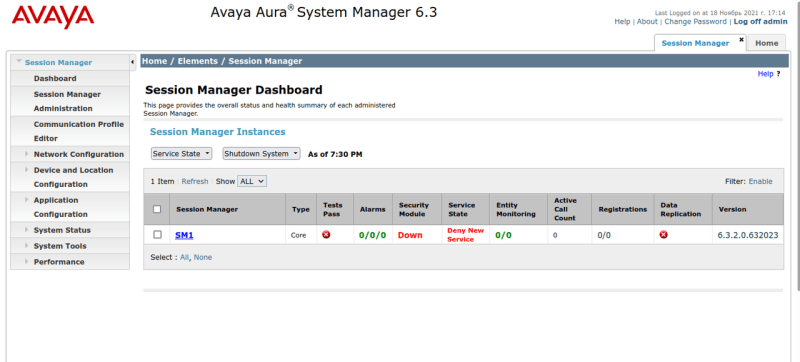FreD_WriteR
Technical User
Problem with Session Manager Security Module.
Security Module status - Down. And the eth2 interface does not ping. I installed Session Manager from two disks: linux for ASM and ASM-installer. When I installed the first disk, I immediately configured the interfaces and checked the ping. All ip pinged. After installing ASM-installer, SMGR and other hosts from the subnet stopped pinging Security Module - eth2. This is fine? Another problem - InitTM and initDRS are not executed, an error occurs:
I think because the Security Module is not pinged.

swversion:
ASM:
SMGR:
hosts files:
ASM:
SMGR:
SMGR Sertificate:
Security Module status - Down. And the eth2 interface does not ping. I installed Session Manager from two disks: linux for ASM and ASM-installer. When I installed the first disk, I immediately configured the interfaces and checked the ping. All ip pinged. After installing ASM-installer, SMGR and other hosts from the subnet stopped pinging Security Module - eth2. This is fine? Another problem - InitTM and initDRS are not executed, an error occurs:
Code:
Register replica node with System Manager DRS master failed.
Thu Nov 18 20:13:15 VLAT 2021: Failed to initialize DRS.
swversion:
ASM:
Code:
Avaya Aura Session Manager Software Version Inventory
Release: 6.3.2.0.632023
Call Processing: 6.3.2.0.632023
Management: 6.3.2.0.632023
SM Tools: 6.3.2.0.632023
DRS: 6.3.2.0.632023
CDR: 6.3.2.0.632023
NCS: 7.65.04
Security Module: 6.3.2.0.632003
nginx: 1.2.0
Firewall: 6.3.2.0.632003
WebSphere AS: 8.0.0.5
SAL Agent: 6.3.2.4
OS: Enterprise Linux Server release 6.2 (May 15 2:10:59 MDT 2013)
Code:
************************************************
System Manager - Software Information
************************************************
===== Software Update Revision: 6.3.0.8.923 =====
System Manager 6.3.8.0 Build Number 6.3.0.8.5682
Patch 6.3.8.818 Build Number 6.3.0.8.923
Quantum 3.1.8-SNAPSHOT(6135) 3.1.8.0 Build Number 6.3.0.8.5682
Communication Server 1000 1.0.2.0 Build Number 1.0-SNAPSHOT-8665
Patch 1.0.2.1 Build Number 6.3.0.8.923
MMCS 6.3.8.0 Build Number 6.3.0.8.1
Communication System Management 6.3.8.0 Build Number 6.3.8.0.4379
Patch 6.3.8.6308003 Build Number 6.3.0.8.923
Messaging 6.3.8.0 Build Number 6.3.8.0.1794
Patch 6.3.8.6308001 Build Number 6.3.0.8.923
Device Inventory 6.3.8.0 Build Number 6.3.8.0.1833
Patch 6.3.8.6308001 Build Number 6.3.0.8.923
B5800 Branch Gateway 6.3.8.0 Build Number 6.3.8.0.2376
Upgrade Manager 6.3.8.0 Build Number 6.3.8.0.2148
Patch 6.3.8.6308001 Build Number 6.3.0.8.923
Session Manager Element Manager 6.3.0.0 Build Number 6.3.0.0.630002
Patch 6.3.0.630024 Build Number 6.3.0.8.923
Conferencing 6.3.107.0 Build Number 6.3.0.0.107
Presence Extensions 6.3.8.0 Build Number 6.3.0.0.0800
************************************************
Operating System Information
************************************************
CentOS release 5.6 (Final)
Linux smgr.eao.ru 2.6.18-308.13.1.el5xen #1 SMP Tue Aug 21 17:51:21 EDT 2012 x86_64 x86_64 x86_64 GNU/Linux
************************************************
JAVA Version
************************************************
java version "1.6.0_33"
Java(TM) SE Runtime Environment (build 1.6.0_33-b04)
Java HotSpot(TM) 64-Bit Server VM (build 20.8-b03, mixed mode)ASM:
Code:
# Do not remove the following line, or various programs
# that require network functionality will fail.
127.0.0.1 localhost.localdomain localhost
::1 localhost6.localdomain6 localhost6
192.11.13.5 services-laptop
10.31.200.50 SM1 GMI-SM1.global2.avaya.com GMI-SM1 ASM
192.11.13.17 smgr.slu.com AsmSysMgr
10.31.200.82 smgr.slu.com smgr AsmSysMgr GMI-SP4-SMGR.global2.avaya.com GMI-SP4-SMGR
Code:
[admin@smgr ~]$ cat /etc/hosts
127.0.0.1 localhost.localdomain localhost
10.31.200.82 smgr.slu.com smgr AsmSysMgr GMI-SP4-SMGR.global2.avaya.com GMI-SP4-SMGR
::1 localhost6.localdomain6 localhost6
10.31.200.50 SM1 GMI-SM1.global2.avaya.com GMI-SM1 ASMSMGR Sertificate:
Code:
[root@smgr ~]# openssl x509 -text -in /var/lib/pgsql/data/server.crt|grep "Not After"
Not After : Oct 21 06:19:08 2023 GMT